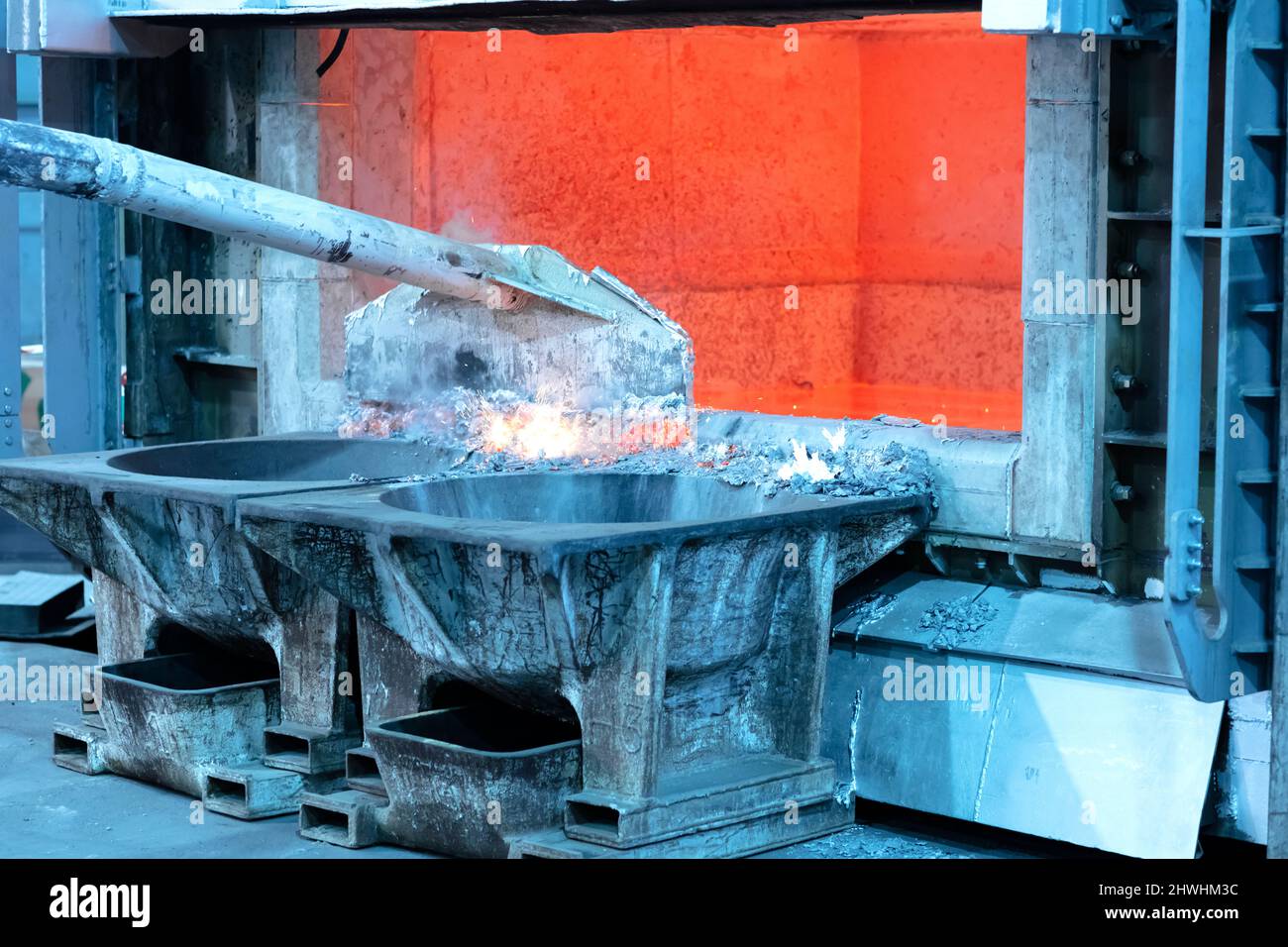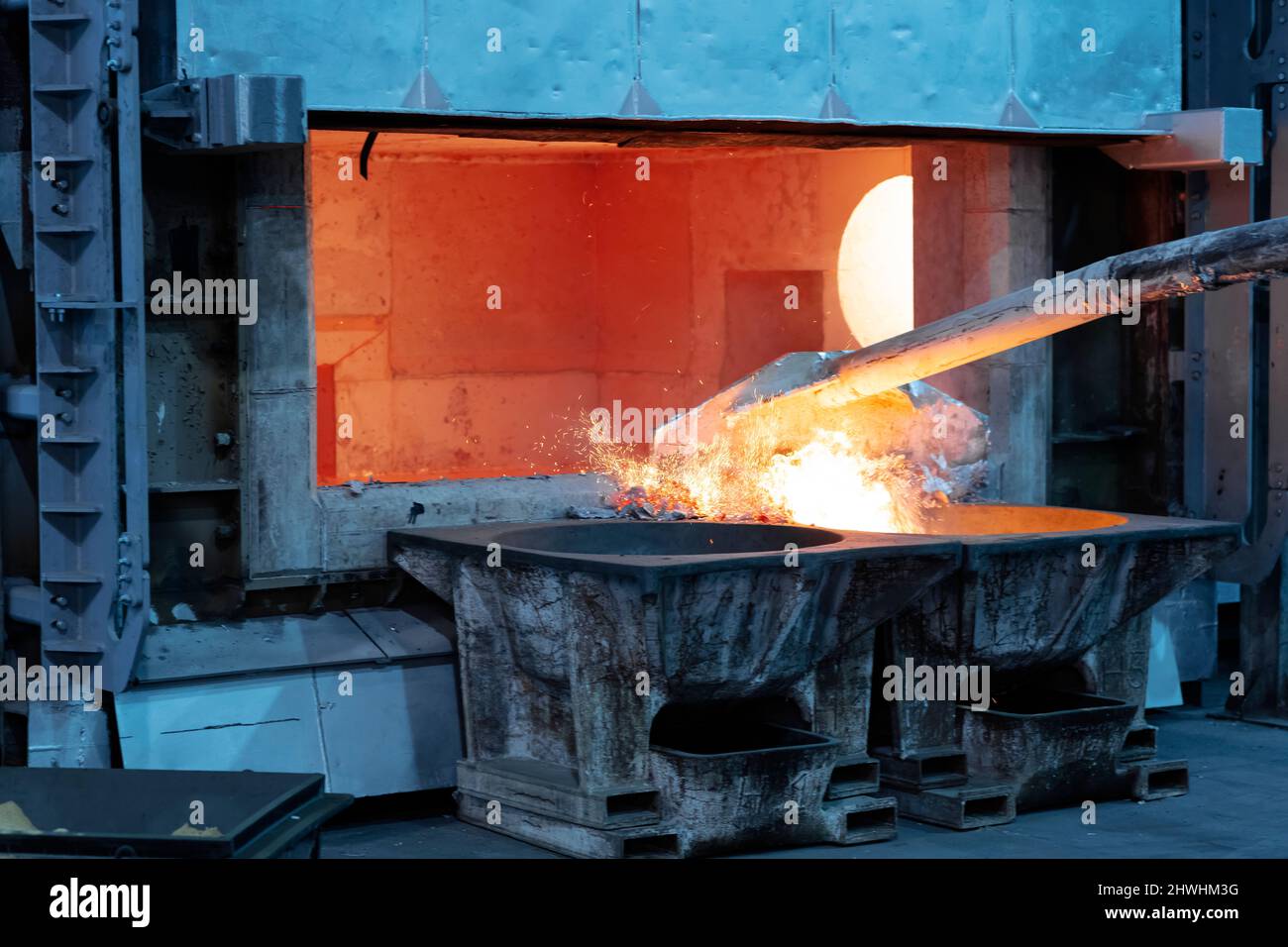Aluminum Foundry Wisconsin is known for excellence in casting
Recognizing the Benefits and Innovations in the Aluminum Foundry Industry
The Aluminum Foundry industry plays a crucial role in contemporary manufacturing. Its lightweight residential or commercial properties significantly improve gas performance, particularly in vehicle and aerospace markets. Furthermore, Aluminum's resistance to corrosion warranties long life in different applications. As the sector advances, technologies such as innovative recycling and additive manufacturing are improving manufacturing techniques. Exploring these developments discloses not just the benefits yet also the difficulties in advance for Aluminum shops in a swiftly altering market.
The Lightweight Advantage of Aluminum
Aluminum's lightweight nature offers significant advantages across numerous sectors, specifically in production and transportation. Its low thickness permits the manufacturing of elements that are much easier to set up and deal with, causing lowered labor expenses and enhanced efficiency. In the automobile market, lighter lorries add to boosted fuel economic climate and reduced exhausts, lining up with global sustainability objectives. In a similar way, in aerospace, making use of Aluminum decreases the overall weight of airplane, which is essential for boosting efficiency and decreasing operational prices.
Furthermore, Aluminum's light-weight properties assist in innovative layouts that were formerly unfeasible with heavier materials. This adaptability allows manufacturers to create intricate forms and frameworks while preserving architectural honesty. On the whole, the light-weight advantage of Aluminum not just enhances item performance yet likewise drives developments in modern technology and style, making it a recommended material in different applications.
Corrosion Resistance and Toughness
The Aluminum Foundry industry is renowned for producing products with superior corrosion resistance, making them optimal for various applications. This home, combined with improved structural honesty, contributes to the durable efficiency advantages that Aluminum parts provide. Therefore, industries increasingly depend on Aluminum to meet demanding environmental conditions without jeopardizing quality.
Superior Corrosion Resistance
While different metals deal with considerable obstacles from environmental factors, Aluminum sticks out for its remarkable deterioration resistance, making it a recommended choice in many applications. This building is primarily due to a natural oxide layer that bases on the Aluminum surface, supplying an obstacle versus wetness and corrosive agents. Unlike other metals that might corrosion or break down with time, Aluminum preserves its stability even in severe atmospheres, such as seaside areas or industrial settings. Additionally, its lightweight nature combined with deterioration resistance makes it perfect for applications in aerospace, vehicle, and marine industries. On the whole, Aluminum's phenomenal durability not just improves product longevity but additionally decreases maintenance costs, offering an engaging advantage for customers and producers alike.
Boosted Architectural Stability
Engineers and developers significantly acknowledge the importance of enhanced structural stability in contemporary applications, where both rust resistance and durability are important. Aluminum alloys, recognized for their light-weight properties, additionally exhibit outstanding resistance to rust, making them ideal for severe environments. The innovative methods employed in the Aluminum Foundry market add significantly to generating components with improved durability. Advanced casting procedures and alloy make-ups are tailored to meet details performance demands, ensuring that structures can hold up against extreme conditions without compromising honesty. Moreover, surface therapies and layers boost the lifespan of Aluminum products, even more mitigating damage over time. This concentrate on improved architectural integrity not only prolongs the usability of materials but also reduces upkeep prices, strengthening Aluminum's setting as a material of option in different markets.
Resilient Efficiency Conveniences
Durable efficiency in Aluminum parts is largely credited to their remarkable rust resistance and longevity. Unlike numerous metals, Aluminum normally creates a safety oxide layer, which protects against corrosion and degeneration in different settings, consisting of aquatic and commercial settings. This integral home significantly extends the lifespan of Aluminum products, minimizing upkeep and substitute costs. Additionally, the light-weight nature of Aluminum improves its applicability across sectors without jeopardizing stamina. The material's resistance to deterioration also adds to its integrity sought after applications, making it an optimal option for auto, aerospace, and construction fields. As markets significantly prioritize sustainability and durability, Aluminum's efficiency advantages line up with modern design needs, solidifying its duty in ingenious production processes.
Ecological Impact and Sustainability
 As the Aluminum Foundry market develops, it significantly prioritizes environmental effect and sustainability, identifying the need for accountable techniques in the face of climate modification. Initiatives to minimize waste and energy usage go to the forefront, with numerous shops adopting recycling campaigns to reclaim Aluminum scrap. This not just reduces resources usage but likewise especially lowers energy expenditure, as recycled Aluminum calls for only a fraction of the energy compared to primary production.
As the Aluminum Foundry market develops, it significantly prioritizes environmental effect and sustainability, identifying the need for accountable techniques in the face of climate modification. Initiatives to minimize waste and energy usage go to the forefront, with numerous shops adopting recycling campaigns to reclaim Aluminum scrap. This not just reduces resources usage but likewise especially lowers energy expenditure, as recycled Aluminum calls for only a fraction of the energy compared to primary production.In addition, developments in discharges manage innovations are being implemented to decrease air contaminants, straightening procedures with more stringent ecological laws. Foundries are also exploring alternative power resources, such as solar and wind, to power their facilities sustainably. By promoting collaboration with stakeholders, the industry aims to create cutting-edge options that improve environmental stewardship. Collectively, these initiatives highlight a commitment to reducing the Aluminum Foundry's carbon impact while advertising a circular economy within the manufacturing field.
Advanced Production Techniques
 Revolutionizing manufacturing processes, the Aluminum Foundry market is progressively incorporating sophisticated manufacturing strategies to improve efficiency and accuracy. Techniques such as computer system numerical control (CNC) machining and additive manufacturing have become vital components in maximizing production operations. CNC machining allows for high-precision part fabrication, substantially minimizing product waste and production time. At the same time, additive manufacturing opens up brand-new avenues for intricate geometries and lightweight styles that were formerly challenging to attain.
Revolutionizing manufacturing processes, the Aluminum Foundry market is progressively incorporating sophisticated manufacturing strategies to improve efficiency and accuracy. Techniques such as computer system numerical control (CNC) machining and additive manufacturing have become vital components in maximizing production operations. CNC machining allows for high-precision part fabrication, substantially minimizing product waste and production time. At the same time, additive manufacturing opens up brand-new avenues for intricate geometries and lightweight styles that were formerly challenging to attain.Furthermore, the release of automation and robotics in Aluminum foundries enhances procedures, minimizes human mistake, and boosts employee safety. These modern technologies facilitate a more responsive manufacturing environment, making it possible for manufacturers to adapt promptly to market needs. The integration of sophisticated simulation software even more boosts the design and screening phases, causing superior product quality. Collectively, these methods not only enhance functional effectiveness yet additionally foster advancement, placing the Aluminum Foundry industry at the forefront of contemporary production.
Developments in Recycling Processes
The More Help Aluminum Foundry sector is not just progressing in producing techniques but is likewise making significant strides in reusing procedures. Developments are emerging to enhance the performance of reusing techniques, minimizing energy consumption and boosting sustainability. Advanced sorting innovations, such as automated optical sorting, enable the recognition and splitting up of Aluminum from other materials with high accuracy. This brings about a greater top quality of recycled Aluminum, which is essential for maintaining the honesty of the last items.
Closed-loop recycling systems are being implemented, permitting suppliers to recycle Aluminum scrap within their very own manufacturing processes. This lessens waste and promotes a circular economy. Furthermore, research right into new recycling strategies, such as hydrometallurgical procedures, uses the potential for recovering Aluminum from intricate waste streams. These advancements not only add to lowering the carbon impact of the Aluminum Foundry sector yet likewise boost its financial viability in a progressively environmentally mindful market.
Applications Throughout Various Industries
Many sectors are progressively recognizing the convenience and benefits of Aluminum Foundry products, causing prevalent applications across fields such as automotive, construction, customer, and aerospace products. content In the automobile market, Aluminum spreadings add to light-weight car layouts, enhancing gas performance and performance. Aerospace suppliers utilize Aluminum components for their strength-to-weight ratio, crucial for aircraft structures and parts.
In building, Aluminum is favored for its durability and resistance to corrosion, making it optimal for window frameworks, roof, and architectural supports. Durable goods additionally take advantage of Aluminum Foundry items, as seen in cookware, electronic devices, and product packaging, where lightweight and recyclable materials are important.
The versatility of Aluminum Foundry methods permits specific specifications and intricate designs, providing to the varied needs of these industries. As a result, Aluminum Foundry items are ending up being essential to contemporary manufacturing processes throughout different sectors.
Future Trends in Aluminum Foundries
As sectors remain to develop, Aluminum shops are positioned to welcome a number of key fads that assure to boost effectiveness and sustainability. One famous pattern is the enhancing adoption of electronic innovations, including automation and artificial knowledge, which improve operations and enhance quality assurance. In enhancement, the push in the direction of sustainable methods is leading shops to buy recycling technologies, considerably lowering waste and power consumption.
 Another arising pattern is the use of advanced alloys and materials, dealing with the expanding need for light-weight and resilient parts throughout various industries (Aluminum Foundry). Furthermore, the combination of additive production strategies is anticipated to reinvent part design, offering customization and lowering lead times
Another arising pattern is the use of advanced alloys and materials, dealing with the expanding need for light-weight and resilient parts throughout various industries (Aluminum Foundry). Furthermore, the combination of additive production strategies is anticipated to reinvent part design, offering customization and lowering lead timesPartnership with study institutions is additionally anticipated to drive development, as factories seek to establish brand-new procedures and products. Aluminum Foundry. Jointly, these fads show a transformative future for the Aluminum Foundry sector, aligning with broader goals of sustainability and efficiency
Often Asked Concerns
What Are the Normal Prices Related To Aluminum Foundry Production?
The common prices connected with Aluminum Foundry manufacturing include resources, labor, energy, devices upkeep, and overhead costs. These aspects collectively affect the overall monetary investment needed for efficient Aluminum casting procedures.
How Does Aluminum Contrast to Various Other Steels in Stamina?
Aluminum, while lighter than numerous metals, shows impressive strength-to-weight ratios. Compared to steel, Aluminum is less strong yet provides outstanding corrosion resistance, making it a beneficial option in applications where weight and durability are vital.
What Security Steps Are in Area in Aluminum Foundries?
Precaution in Aluminum foundries typically consist of compulsory personal protective tools, air flow Find Out More systems to regulate fumes, normal tools upkeep, training programs for workers, and adherence to rigorous security guidelines to decrease dangers related to liquified metal handling.
How Is Top Quality Control Managed in Aluminum Casting Processes?
Quality control in Aluminum spreading processes entails strenuous evaluations at different phases, including basic material analysis, process surveillance, and end product screening. Strategies such as analytical procedure control and non-destructive testing assurance adherence to market requirements.
What Qualifications Are Necessary for Aluminum Foundry Distributors?
The relevance of certifications for Aluminum Foundry suppliers consists of ISO 9001 for high quality management, ISO 14001 for environmental management, and industry-specific requirements like ASTM and SAE, ensuring compliance, safety, and integrity in manufacturing processes.
The Aluminum Foundry industry plays an essential role in modern manufacturing. The Aluminum Foundry industry is renowned for producing products with exceptional rust resistance, making them perfect for numerous applications. Changing production processes, the Aluminum Foundry market is progressively incorporating innovative manufacturing methods to improve performance and accuracy. The Aluminum Foundry sector is not just advancing in manufacturing methods however is additionally making substantial strides in reusing procedures. As sectors continue to develop, Aluminum factories are positioned to welcome several vital fads that promise to improve performance and sustainability.